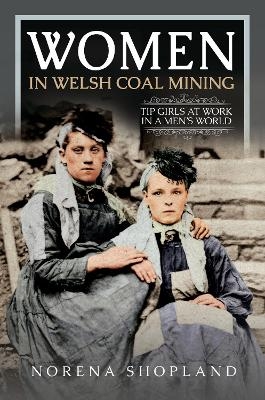
Women in Welsh Coal Mining
Pen & Sword History (Verlag)
978-1-3990-7522-0 (ISBN)
We tend to think of coal mining as predominantly a male occupation, with women confined to roles as wives and support workers. Women worked at the coal face for many years before they were banned in 1842. However, mere legislation was not going to stop them - many continued to work underground, with mine owners making little attempt to stop them due to the low wages paid to women. Some would dress and pass as men to fool visiting inspectors. For the majority though, they worked on the pit brow where they received the coal, cleaned, sorted and cut it to uniform size. Dirty, laborious work, including many accidents and deaths, done by women and girls, some as young as 10 years old.
Society was appalled, and harshly criticised women (but not men) for working in such environments and so close to male workers. Find a respectable job, like domestic service, they were told - despite the fact that few jobs for women were available in such industrialised areas. Like the more famous Pit Brow Lasses of Lancashire, the Tip Girls were castigated for having 'unsexed' themselves, accused of immorality, of being unfit wives and mothers and society went on a mission to save them. But the Tip Girls did not want to be saved.
For nearly a hundred years, these women fought society and Parliament to keep their jobs and clear their reputations. Norena Shopland tells their story for the first time. New research from census returns and newspaper accounts have uncovered over 1,500 named women who worked in the Welsh coalfields - only a few could be included in this book - but it shows how much more work is needed in order for us to continue to celebrate these remarkable women.
Norena Shopland is a Welsh author/historian specialising in the history of sexual orientation and gender identity. Her book Forbidden Lives: LGBT stories from Wales (Seren Books, 2017) is the first entirely historical work on Welsh LGBTQ+ history. Queering Glamorgan (free download from Glamorgan Archives) and A Practical Guide to Searching LGBTQIA Historical Records (Routledge, 2020) have become very popular as toolkits to aid people in doing research. In 2021 Shopland was commissioned by the Welsh Government to deliver LGBTQ+ training to local libraries, museums, and archives in Wales, the only government in the world to have done so. Her book A History of Women in Men's Clothes: from cross-dressing to empowerment (Pen and Sword Books, 2021) explores how women throughout history escaped the confines of social expectations by cross-dressing. Shopland also researches and writes on Welsh history including The Welsh Gold King: the life of William Pritchard Morgan (Pen and Sword Books, 2022) and his involvement in the last gold rush in the UK; and Women in Welsh Coal Mining: Tip Girls at Work in a Men's World (Pen and Sword Books, forthcoming 2023) the previously untold story of women working in the Welsh coal industry.
| Erscheinungsdatum | 11.05.2023 |
|---|---|
| Zusatzinfo | 25 mono |
| Verlagsort | Barnsley |
| Sprache | englisch |
| Maße | 156 x 234 mm |
| Themenwelt | Geschichte ► Teilgebiete der Geschichte ► Kulturgeschichte |
| Technik ► Bergbau | |
| ISBN-10 | 1-3990-7522-5 / 1399075225 |
| ISBN-13 | 978-1-3990-7522-0 / 9781399075220 |
| Zustand | Neuware |
| Haben Sie eine Frage zum Produkt? |
aus dem Bereich


